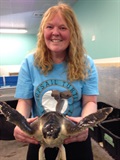
While we were enjoying our extended warmth into December the New England Aquarium was gathering up their first batch of frozen sea turtles and preparing them for transport to other facilities for extended care. A few weeks ago we picked up nine banana boxes of little Kemp’s that arrived by private plane in Beaufort. Our Yankee friends were really on their toes because these critters appear to have been rescued before too much obvious damage had been done. But if you’ve been reading this column over the years and have visited our facility you know that the really serious stuff can take months to show up.
The Kemp’s, who have been named after characters in the Harry Potter books have made themselves at home in Sick Bay where they receive extra TLC by our volunteers. At first reluctant to eat (except for one who continues to eat enough for all of them and asked to identified only as “Turtle X”) they’ve begun to appreciate their skillfully prepared fish, squid and shrimp and the individual attention they receive during their morning meal. Treatment continues with a soapy bath, topical potions for cuts and abrasions and eye drops and injections as needed. Kemp’s have a lot of attitude no matter how tiny they are (and we have a few bitty ones) so Sick Bay is a pretty hoppin’ place these days. And probably about to get a lot more crowded after last weekend.
Please be on the lookout for any turtle stranded on the beaches or in the marshy areas as it’s very possibly a cold-stun. Do not assume it is dead even though it is cold and not moving. Cold-stuns are unable to move their flippers, head or even blink their eyes because all of the blood has been redirected to their core to keep their vital organs functioning. They are vulnerable to wind, blowing sand and predators. They are helpless.
If you find a critter in this situation carefully pick it up and place it in an unheated area like your garage or car. Do not try to warm it up as a rapid change in temperature might cause it to go into shock. It’s important that the critter not lay exposed on the beach for hours, subject to weather and predators. Call our Director of Beach Operations, Terry Meyer at: 910-470-2880 or Jean at: 910-470-2800. You may also call the State of NC hotline for stranded, sick and injured turtles at: 252-241-7367 (picks up 24/7) or our hospital during operating hours: 910-329-0222. If you are local we will quickly send one of our volunteers to retrieve the turtle for follow-up care at the hospital.



